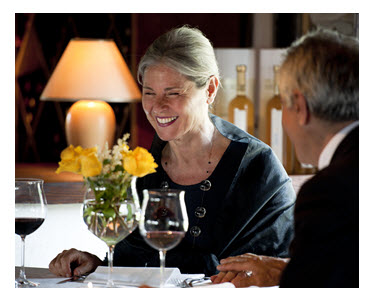We’re chatting about relationships. A string of bad relationships – and bad relationship choices. Mine.
 I insist that I never saw the end coming. Or for that matter, I didn’t predict the less than happy “middle” either.
I insist that I never saw the end coming. Or for that matter, I didn’t predict the less than happy “middle” either.
“We all have choices,” he says to me. “Some of us may have fewer, or the options are narrower. But we all have choices.”
He’s an old friend. A trusted friend. The conversation took place long ago, but these are words that stick.
We all have choices.
Not only is this advice that guides us in our personal lives – whom we love, what we tolerate, and how we extricate ourselves from bad situations – but the issue of available options pertains to nearly all areas in our lives. When we can bring ourselves to see clearly, including how we – and circumstances – may be changing, we recognize that even with constraints, we exercise choice.
And how often we forget that inaction is also a choice.
Standing at the Fork in the Road
We may not be crazy about our options, but they are present – in our relationships, in our tiny moral dilemmas that we navigate daily, in those Big Decisions wherein we are standing at the fork of the road and we know that choosing one direction over the other will alter everything that follows.
We know the shape of these monumental moments: college, job, relocation, spouse, have a child, don’t have a child.
Rinse and repeat… for any of the above.
As for individual circumstances, some may be fortunate in possessing more options by virtue of money, location, support systems, good health, unflagging spirit. They may be earned or they may be a given. Demographics may also come into play. For example, if you are 35, you have a greater amount of time ahead of you to recover from a misstep or less than optimal outcome than if you are 55. This is logical and a consideration, but not necessarily an unyielding constraint.
These choices may present themselves at the fork of small, smoothly paved roads – or potentially, a journey that is longer and bumpier, no matter which direction you choose. The stakes as well as the risks are important; we may dare professionally, where we would not, personally.
Critical Tipping Point in Relationships
And in romantic partnerships – as with everything else in life – we have choices. At times, we find ourselves at a tipping point and yesterday’s simple response becomes today’s critical decision: Stay, go, pull back, shift roles, negotiate – open our eyes, close our eyes, step into the experience of the other person. (That last is key. Our interpretation is not necessarily the “correct” view of what’s taking place.)
Perhaps one incident is the straw that breaks the camel’s back – one too many nights of cruel words fueled by alcohol, one too many nights of absolute indifference, the dead bed that leaves you feeling increasingly dead inside, knowledge of another woman or another man.
 We may also decide to hang in, hoping things will change. And maybe they can. But maybe they cannot. And we all know the definition of crazy – doing the same thing over and over and expecting a different result.
We may also decide to hang in, hoping things will change. And maybe they can. But maybe they cannot. And we all know the definition of crazy – doing the same thing over and over and expecting a different result.
Bad Penny, Bad Apple, Bad News
In careers, we also have choices, though they may seem more complicated because we are operating within a structure of many moving, interdependent parts, at times with less information than we might like.
So what happens when you run into what seems like an obstacle you cannot walk around, you cannot blast your way through, and you cannot diminish in size through action or communication? What happens, even in a good relationship, when you constantly butt heads on one critical topic, and eventually you weary of nursing your bruises? What happens when you are the problem – and the quintessential “I want out but won’t say so” line, the notorious “It’s not you, it’s me” – is true?
What if you come to understand that you cannot give what he wants, or what you want is simply different? What if the situation isn’t so cut and dry? What if there are children and their future hanging in the balance? What if your ability to survive financially – or his – is all part of the decision?
Why We Make Bad Relationship Choices
Why do people make bad choices time and time again – especially in their romantic lives?
Several reasons come to mind:
- We are playing out childhood relationships; they are familiar, and unconsciously, we repeat these painful or destructive patterns
- We feel we are less than deserving of something better; we accept whatever comes our way
- We believe it is better to have someone / some sort of relationship than no one / no relationship at all; we are afraid to be on our own
- We should revisit criteria for our choices; we go for what looks good on paper versus substance
- We get lazy or tired; changing our habits and staying alert can be hard work
Let’s also not forget: Sometimes the other person is playing games, hiding who he is, or intentionally misleading. We aren’t always operating from a place of full or mutual disclosure.
 I’m certain these aren’t the only reasons, but I’ve observed them all, often, and lived the first two myself – and more than once.
I’m certain these aren’t the only reasons, but I’ve observed them all, often, and lived the first two myself – and more than once.
Changing Our Patterns, Broadening Our Choices
I do not think it serves us to ignore our constraints. They are real.
I do not think it serves us to accept our constraints as a life sentence; what obstructs us at one point in time may not in the future.
Again: We all have choices, and many more than we may initially perceive. Our task is to balance the ability to visualize an element of that unimpeded future and to take necessary actions to make it more probable. This balancing act can lead us to a broader set of choices than we may realize.
Sometimes a wise old friend can assist. Or possibly, a stranger who triggers a light bulb moment. His or her wise counsel reassures us that we are worthy, reminds us what we have achieved, urges us to open our eyes to the array of options – many good, some frightening, some uncomfortable – as they push us to expand our boundaries, for the better.
We may also underestimate the number of choices that are open to us. For example, if something is bothering me in a relationship, I may choose to speak up, say nothing, pick an optimal time to raise the topic, hint at what bothers me, confront it directly – and of course, the words and tone I use will also influence the willingness of the other party to discuss any issues.
Looking Forward, Taking on Incremental Change
How do you decide what’s next? Are you willing to dare a change – even if only one small element of your usual pattern? Isn’t this the way we make progress so we stop making the same bad choices over and over again?
Do you consider demographics when it comes to dating? What if you loosen up on age, height, weight, location, profession – and thereby increase the probability of meeting someone unexpected who is nonetheless very compatible?
Can we take a chance on an evening out with the Geeky Guy, the Younger Guy, the Otherwise Unlikely Match – hoping we may make a friend, and if it’s something more, why not?
Do you consider the amount of time “invested” – and does that keep you in an unsatisfying relationship? Do you consider your kids and their input? What about the input of extended family and friends?
How do you decide what sort of relationship is worth fighting for and how long – with or without a piece of paper?
Of course, it helps to know yourself, to know what you want, and to feel good about who you are and the way you’re living your life. When you aren’t happy with yourself, of course, nothing else will seem quite right, and it’s all too easy to point the finger at other people.
You May Also Enjoy
Nice piece, D.A. You’ve certainly covered all the bases and the wisdom comes from experience but also from self-awareness. I’d like to share it with a friend, whose life seems like a broken record, but I’m not quite sure how she would respond or if she’d even see herself in it.
Happy weekend!
Thanks for stopping by, Judith. Perhaps your friend, like so many of us (myself included) has to make the same missteps several times before really trying something different. There’s a reason patterns are, well… precisely that. They become natural, and they’re also comfortable.
Some of us learn late (moi!), but we do learn, albeit incrementally!
Happy weekend to you too.
xo
Staying alert and changing our habits can be hard work. Isn’t that true? Self reflection and seeing ourselves from an unlfiltered perspective are difficult, almost impossible, but become, at some point, necessary. And it takes courage. Often it’s from what may just come about as a passing remark from someone, or a deep conversation, or a hired business, career or life coach, that gives you an ah-hah moment. Like your long time friend’s remark about choices. Then the stepping into the uncomfortable to make the change is easy to put off too, right? We settle into what’s comfortable. We intuitively know when something or someone is wrong. And then for me, it’s been a matter of how long am I going to put up with it, or what will be the straw that breaks that proverbial camel’s back before I choose to set things right for my life.
Intuition. So glad you mentioned it, Barbara. Why don’t we listen more often? (Eventually, we learn to… Thankfully!)
Your list of reasons why we make bad choices has a lot of wisdom. Some of those reasons resonate – several, in fact, which might explain why I made so many poor choices! One thing about your example of 35 vs 55 and time to recover, I’m more cautious financially and learning to be so physically but emotionally I’m far braver than in my youth. I’m more confident, trust my own instincts and know from having survived many past disasters that I can recover emotionally again. “This, too, shall pass” has been my watchword for a while now. And making different choices is wise. I finally put aside my usual criteria for choosing men when I found that I really admired Bill’s character. Smartest thing I ever did. Best relationship I’ve ever had.
I’m with you on the increased (financial) caution, Shelly. Time frames “remaining” to recoup (and the economy) tend to shift our views.
I know what you mean, being lazy and tired. I think that’s the end of the road for some. Not doing anything, just staying in their current situation and maintaining the status quo. It’s sad.